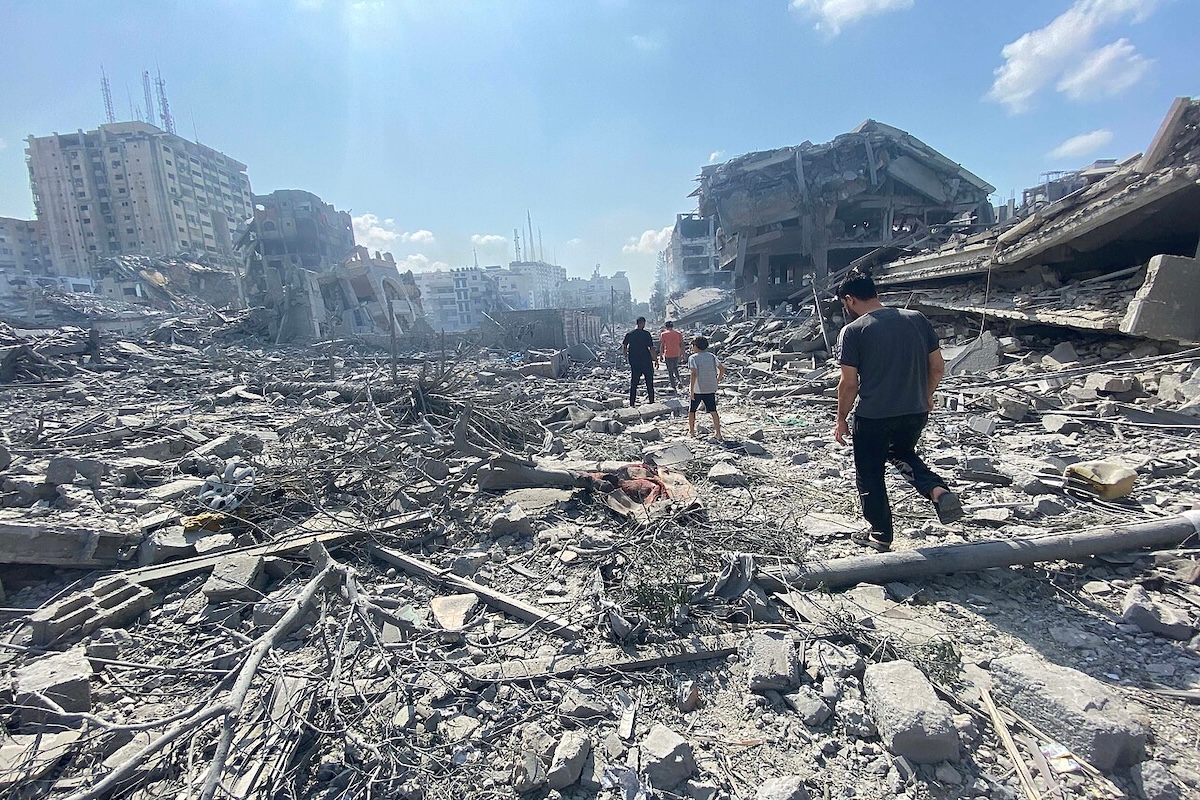In a rational future, poet Mosab Abu Toha would be awarded the Nobel Peace Prize for his ongoing testimony about the consequences of Israel’s aggression in Gaza. He is a singular voice and, at the same time, a multitude of voices.
“Every child in Gaza is me,” he writes, in the preface to his newest book, Forest of Noise (2024). “Every mother and father is me, Every house is my heart.”
The toll of Israeli assaults on Gaza are horrifying. Current UN estimates put the numbers at 43,665 Gazans killed, 103,076 injured, and more than 100,000 displaced since October 7, 2023. But these numbers swamp our minds. Abu Toha, once a schoolteacher, now both a journalist and poet, transforms them into human reality.
In “Under the Rubble”, he writes,
A father wakes up at night, sees
the random colors on the walls
drawn by his four-year-old daughter.
The colors are about four feet high.
Next year, they would be five.
But the painter has died
in an air strike.
The chronicling of memories and Gazans’ daily experience of loss immerse Abu Toha’s readers in the scope of the current disaster. But his most compelling reflections are about the future of Gazan children confronted with the almost impossible challenge of growing up in refugee camps, encircled with the memories of lost parents, siblings, friends with only sporadic, fleeting opportunities for childhood.
- his young son grabbing a blanket to put over his 4-year-old sister when a nearby bomb explodes, saying “You can hide now”,
- the prospect of coming years for “young men with one or no legs, no longer able to work, as if there was work”,
- the bombing of children playing soccer on the beach.
In reading Abu Toha, it is essential to understand that being a poet does not simply consist of a focus on elegance or poetic form. He explains in an interview featured in his first book, Things You May Find Hidden in My Ear (2022), that poetry allows people to feel what the poet is feeling. And what Abu Toha is feeling is not a generic abstraction.
He describes, for example, the distinctive wave of apprehension Gazans experience from the sound or sight of each kind of aircraft—whether fat -bellied F-16’s (more than 300 supplied by U.S. to Israel), helicopters, drones, or F-35’s, touted as 5th generation equipped with “smart” munitions (part of a $3 billion delivery to Israel in June, 2024).
Contrast that with the semantic evasion of referring to attacks as “mistakes” and victims as “collateral damage” to be investigated, something Abu Toha reveals as a means of using language as a political weapon of war.
Importantly, he goes beyond the tallies of deaths to the half-hidden consequences for those who survive. In his poem, “Request Letter,” penned to the Angel of Death, Abu Toha reminds us that each of the thousands of Gazan deaths is the end to a unique, potentially rich life and the birth of a unique burden of grief for parents, friends, neighbors, community.
His request: When you collect the souls of those killed in an air strike do you mind leaving a sign for us so we know who is who? Because last time my old kindergarten teacher couldn’t recognize her daughter’s face, which ear or arm or bloody finger on the dusty streets was hers…
Abu Toha’s poems trace the throughline between the indiscriminate killing of innocent individuals and the wholesale destruction of homes, gardens, nature, livelihoods, the fabric of community, and how this then erases Palestinians’ history, and their identity as “a people.”
The poems are populated with personal, family, and collective loss—oranges fallen to the ground when his grandmother fled their home in 1948, Israeli bulldozers destroying the cemetery where his brother is buried, the families of students who died when their university was bombed arriving to get a portrait of their son or daughter, not a graduation certificate.
Abu Toha laments the elimination of Palestinian nationhood in “Palestine A-Z” and, at the same time, the tragedy of how his grandparents’ and parents’ generations toiled as refugees to rebuild their family lives in refugee camps only to find themselves re-defined as stateless terrorists and have their community institutions destroyed (schools, hospitals, libraries including the one he had worked so enthusiastically to design as a community center to expand knowledge and host cultural celebrations and events).
His intelligence and vision as a poet, journalist, and activist whose weapon in fighting for his family, neighbors, and community is language—employed to build awareness of Gazan reality—should ignite Americans’ commitment to diligently oppose Israel’s flailing revenge for the barbarism of Hamas, the inevitable consequence of which will be to erode its own safety.
Meanwhile, President-elect Donald Trump’s enthusiastically urging Israeli Prime Minister Benjamin Netanyahu to “Do whatever you have to do…” portends continued U.S. collaboration in what many see as “genocide.”
Abu Toha’s metaphoric spiritual question, “Where should we go” is a critical one that we Americans need to confront. What is our responsibility?
Reading Mosab Abu Toha teaches us that speaking out for humanity is an essential duty for Americans even when an authoritarian regime focused on combatting “the enemy within” (i.e. immigrants, the media, political opponents, etc.) makes it seem fruitless.
Exhausting, endless efforts, but essential since there is no alternative.
Edward Kissam is a leading researcher and advocate for strategies to deal with health issues impacting immigrant communities. He has led research on farmworker and immigrant issues sponsored by the Department of Labor, the Commission on Agricultural Workers, and the National Institute for Food and Agriculture. He is also a trustee of the WKF Charitable Giving Fund.




